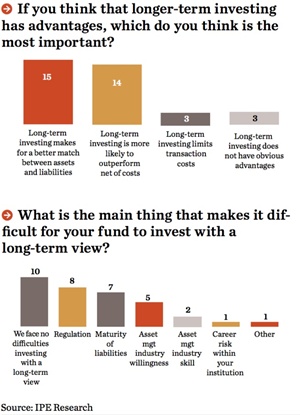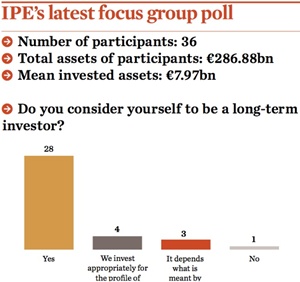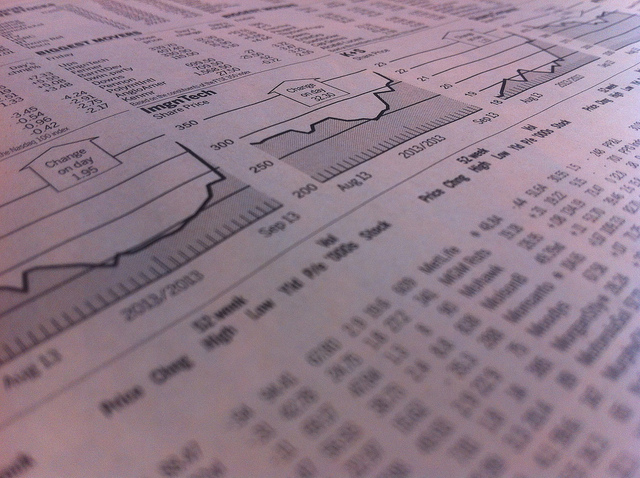
Investments & Pensions Europe released a survey today indicating that three of every four pension funds consider themselves long term investors. But they disagreed on the specifics of long-termism.
In light of the survey, here’s an article by Theresa Whitmarsh, Executive Director of the Washington State Investment Board, discussing how pension funds can move away from short-termism and improve the dialogue surrounding true long-term investing.
The article was published in the Fall 2014 issue of the Rotman International Journal of Pension Management.
Whitmarsh writes:
While solutions to short-termism proposed for institutional investors vary, they coalesce around three themes: first, disintermediation through direct ownership of private assets; second, concentrated holdings of publicly traded securities with commensurate influence over corporate behavior; and, third, collaboration with other investors to influence market behavior. All three models are being tested and successfully implemented, but not at scale.
There are several sound reasons for this. Disintermediation is not always practical for a globally diversified portfolio. Skilled intermediaries who possess asset class, style, sector, and geography expertise will always be in demand (and, unfortunately, even unskilled ones will remain in demand). And holding a concentrated portfolio of public companies runs counter to what we know about active investing: it is very difficult for an active investor to outperform broad market indexes, and index investing remains an efficient and cost-effective way for institutional investors to put large amounts of money to work. Finally, as mentioned earlier, market and governance reform has fallen short of our goals as investors, despite strong governance-focused collaborations. Intermediaries outnumber us, outspend us on lobbying, and are more financially motivated than us to maintain the short-termist status quo.
So while the benefits of long-termism can be many – harvesting an illiquidity risk premium, providing ballast to the capital markets, and encouraging corporations to invest in innovations that sustain their enterprises and society over time – neither investors nor corporations have a particularly strong record.
However, I am becoming more optimistic that a movement for long-termism is afoot, one that is pulling in corporations and intermediaries and that has the potential to get enough traction to change behavior. This movement comes from deep within the corporate sector and is increasingly supported by important market players. It goes by various names – sustainable capitalism, fiduciary capitalism, inclusive capitalism, conscience capitalism – but no matter the moniker, the goal of all these undertakings is to encourage a brand of capitalism that prices in externalities, broadly benefits society, and ultimately sustains the planet. An initiative co-sponsored by the Canada Pension Plan Investment Board and McKinsey, Focusing Capital on the Long Term,1 involves broad participation from investors, money managers, corporations, and finance academics and will be producing several recommendations on how to take these concepts from idea to practice.
Whitmarsh on the three catalysts that she believes will spur long-term investing:
I see three catalysts for the increasing dialog on the benefits of long-termism – the first two self-serving of the market, though not without benefit to society, and the third essential to our survival as a species.
The first catalyst is the need to restore trust in the capitalist system. Trust was one of the main casualties of the Great Recession, according to Christine Lagarde, Managing Director of the International Monetary Fund, who spoke at the Conference on Inclusive Capitalism in London on May 27, 2014.2 Lagarde noted that in a recent poll conducted by the Edelman Trust Barometer, less than one-fifth of those surveyed said they believe that business or government leaders will tell the truth about important issues. This should be a wake-up call, she told her audience; trust is the lifeblood of the modern business economy. The way to restore trust, according to Lagarde, is to ensure that growth is more inclusive, favoring the many, not just the few. She shared a startling statistic: the richest 85 people in the world hold more wealth than the poorest 3.5 billion.
This leads us to the second catalyst: increasing recognition of the negative effect of rising income inequality, in both developed and emerging markets, on the pace of growth. The most unlikely signal that this issue has gone mainstream came in early August, when Standard & Poor’s (2014) published a report that correlates the rise of income inequality in the United States with dampening GDP growth.
The last catalyst is the threat of carbon-emission-induced climate change. Market economies do not price in externalities well, but carbon emissions have to count as potentially the most costly externality ever encountered. (To my mind, only nuclear weapons production comes close.) Even the most self-serving capitalist wants a world in which to keep making money.
Perhaps, with capitalism in crisis, trust in the finance sector at an all-time low, and growing concerns about what we are doing to our planet, we just may – as a society, and collectively as investors – be willing to act.
We have reason to be optimistic that we will act, according to economist Larry Summers. Speaking at the same event as Lagarde, he noted, “This idea that capitalism is about to fail is one we have seen before, and yet it has been a triumph of the capitalist system that it has proven remarkably resilient; that it has given rise to what might be called self- denying prophecies, prophesies of doom that lead to adjustments that lead to repair.”
The entire piece can be read here.
Photo by Santiago Medem via Flickr CC







